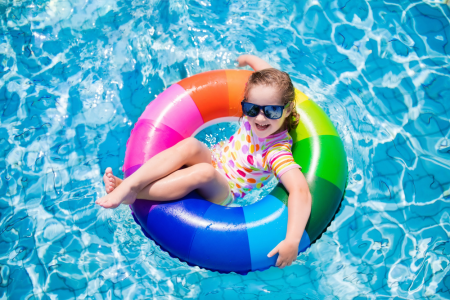A backyard pool is one of the best parts of summer. It’s where birthdays unfold, afternoon heat fades, and kids get to burn off endless energy. But behind the fun, there’s a serious responsibility—keeping everyone safe. For families, pet owners, and frequent hosts, a few simple updates can make all the difference.
Secure the Area Around the Pool
When it comes to pool safety, start with the fence. It should fully enclose the pool and stand at least four feet high. Check local ordinances to get the specific requirements in your neighborhood (many places require fencing exceeding four feet). The gate needs to latch automatically and open outward. That small detail helps prevent young children from pushing through on their own.
If your home opens directly into the pool area, alarms on doors or motion sensors add extra security. Check that any entry point is covered—even sliding doors and side gates.
Choose a Cover That Actually Protects
A cover does more than keep out leaves. When chosen correctly, it adds an extra safety layer. Look for covers built to hold weight and remain secure- especially during prolonged periods without use. Avoid lightweight nets or floating mats. They’re not built for safety, even if they seem like a quick fix.
A solid, anchored cover can block access overnight or during vacation, reducing risk when supervision isn’t constant.
Set the Rules Before the Fun Starts
No running. No diving. No solo swims. These rules are the starting point for pool safety. Every household should establish a short, clear list and make it part of pool time—not something added later.
It’s easy to assume guests will be careful, but kids who swim only a few times a year often need reminders. Post rules somewhere visible or go over them before anyone changes into a swimsuit. It helps set the tone early and avoids confusion later.
Keep Emergency Gear Visible and Close
A life ring, a reaching pole, and a stocked first aid kit shouldn’t be hidden away. Keep them close to the pool and easy to grab. The more visible they are, the quicker someone can step in if something goes wrong.
Pool alarms are worth considering too. They float on the water and send alerts when something/someone enters unexpectedly—especially useful for homes with small children or pets.
Focused Supervision Saves Lives
Even confident swimmers can slip, cramp up, or get distracted. Supervision matters more than swimming ability. One adult should always be in charge of watching the pool during swimming time.
Phones, books, and even conversations can distract. Some families rotate “pool watcher” duties every 15–30 minutes to ensure someone stays focused. It’s a simple habit that makes the entire area feel more secure.
Keep the Water Clean and Clear
Safety also depends on visibility. Cloudy water hides problems. A well-maintained pool lets you spot someone in distress fast.
Brush the walls, skim the surface, test the water, and run the filter, especially during hot months. Aim to test chlorine and pH levels a couple of times each week. When in doubt, most local pool shops offer free water testing and expert advice.
Learn What to Do If Something Happens
No one wants to think about emergencies but knowing how to respond can save a life. If someone goes under, quick action matters more than anything. That’s why learning CPR is worth every minute.
Look for local classes at community centers, fire departments, or hospitals. Having someone in the home who knows CPR adds a serious layer of protection—one that equipment alone can’t match.
A Safer Pool Starts with a Plan
A few adjustments such as better fencing, posted rules, and closer supervision can help improve pool safety and prevent life-changing moments. Pools are meant for joy and connection. With the right steps in place, you get to enjoy every splash with peace of mind.

